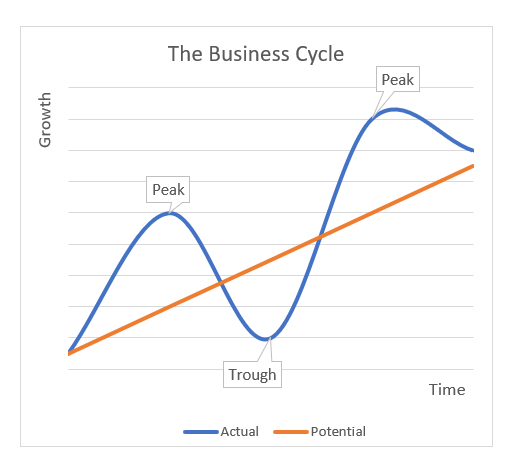Calm the farm, we’re not saying there’s going to be a recession (although the media does love a headline). But if we were to have one, it could be a positive thing. Here’s how.
Recession, recession, recession.
These words are being shouted across media headlines and newspapers around the world as we deal with the impacts of COVID.
It is indeed a difficult time for investors as we face economic challenges that stemmed from a pandemic that we’ve been dealing with for so much longer than expected. But the headlines that suggest Australia is facing a recession for the first time in nearly 30 years is both worrying and confusing.
What about the Global Financial Crisis? Wasn’t that a recession? Should we be particularly fazed if we do indeed head into recession?
Firstly, let us unpack how a recession is defined.
What is a recession?
There are varying definitions of what a recession is around the world but, broadly speaking, it is when the economy fails to grow and falls into a trough (a negative) for a sustained period.
Much like a business cycle where growth can fluctuate, the economy works in the same way, having periods of highs and periods of lows.
When we experience a trough or a period of lows, it usually results in job losses and an increase in unemployment.


It can put a lot of financial stress on businesses and households and the economy essentially slows down or halts.
One of the most common definition of a recession referred to in the media or in textbooks, is a ‘technical recession’ – where there are two consecutive quarters of negative growth.
It can be tempting to sell shares when there is a heightened risk of an economic downturn, but research shows that share prices are forward looking and will generally have fallen in value before a recession even begins.
Will Australia have a recession?
For the moment, Australia has avoided a recession and there’s an air of optimism about 2022. In their February economic outlook, the RBA stated that:
The spread of the Omicron variant will slow growth in the March quarter, but is expected to have a much smaller impact on economic activity than previous waves of COVID-19; activity is forecast to regain momentum in coming quarters. In the central scenario, GDP is forecast to have grown by 5 per cent over 2021, and to grow by around 4.25 per cent over 2022 and 2 per cent over 2023. The unemployment rate is forecast to decline gradually over the forecast period, to 3.75 per cent by the end of 2023.
Even without the current outlook, for long-term investors, there is really no reason why the word ‘recession’ should faze you. A recession is a natural phase of the market cycle and there are benefits.
The positives of a recession
Much like a business cycle, the economy also has a natural progression of highs and lows.
The lows still form a part of a healthy cycle in the overall picture despite the difficulties they bring.
Some of the beneficial effects of a down turn are balancing growth, savings and buying opportunities.
1. Balancing growth
The economy is growing on a larger scale, but progressively up and down.
If growth is continually an upwards trajectory and never slowed down it would mean higher wages. This could lead to higher inflation, meaning a higher cost for everyday goods.
A recession helps slow down the economy and can reset prices to a more manageable level.
2. People are thinking about their savings
During difficult times, people tend to think more about their savings and whether they have enough for the future.
Credit and borrowing are generally down as people prepare and plan to ensure they will get through tougher times.
Whilst this is not great for the economy, it is good practice for many Australians who may not usually think about saving and planning for their future. It can be a turning point to the way people think (or not think) about their finances.
3. Buying opportunities
Tougher economic conditions can mean opportunities to purchase shares at a lower price, which can be beneficial for those looking to enter the market.
The same principles of investing still applies after purchase. That is, investors need to wait for a recovery in the market before they see a gain.
In an ideal world we would prefer not to have a recession. But when they occur, it is important to understand what they mean. There are benefits of this economic situation can mean for investors in the long run.
This is an edited version of an article that originally appeared on Align Financial and is republished here with permission. This article contains general information only. This should not be relied on as independent finance or tax advice. If you are after specific professional advice, speak to your registered tax agent/financial advisor or reach out to Darren at Align Financial.




























Trending
Sorry. No data so far.